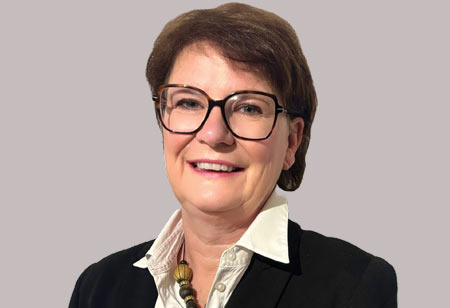

Thank you for Subscribing to Hospitality Business Review Weekly Brief

Stefanie Rothkirch is the Senior Manager of Strategic Procurement Travel at Lufthansa Group; she oversees procurement across Great Britain, Scandinavia, China, Korea and the Indian Ocean, ensuring strategic sourcing and operational efficiency. Since the beginning of her career in 1988, Rothkirch has held various roles in controlling, business analysis and procurement. She has managed procurement for aircraft interiors, hangar construction and hotel capacities, blending financial strategy, contract management and negotiation.
In an interview with Hospitality Business Review, Rothkirch highlights her lifelong journey in the travel and aviation industry, the transformative role of data analytics in procurement, the value of regional market expertise and cultural understanding, the growing importance of sustainability and the key skills needed for success in the ever-evolving travel sector.
A Lifelong Journey in Travel and Aviation
I have worked in the travel industry since 1988, but my connection to travel and aviation goes back much further. It all started in 1967 when my father was part of the Lufthansa team developing the iconic 747 in Everett, America. Some of my earliest memories are tied to aviation—I even flew back to Frankfurt on the first 747 when it was delivered. From that moment on, I knew there was nowhere else I wanted to be but in the airline industry.
Developing intercultural awareness is crucial for effective collaboration. It helps understand different perspectives on negotiations, decision-making and business interactions
Starting as a maintenance department secretary, I quickly realised I wanted to take over broader tasks with more scope of design. So, I pursued a master’s degree in business administration. After earning my MBA, I moved through various business roles before discovering my true calling in procurement. It’s a fascinating mix of psychology, legal expertise, financial know-how and negotiation skills that drew me in
I’ve handled commodities from aircraft cleaning to aircraft interiors before finally finding my way to hotel procurement. It’s a perfect fit—dynamic, international and never dull.
The Power of Data Analytics in Procurement
Data analytics is becoming increasingly important worldwide, particularly in procurement. When evaluating hotels, for example, vast amounts of data must be analysed to determine whether they align with specific product requirements and meet organisational standards for quality, cost and sustainability.
Leveraging data analytics can be a game-changer, shifting procurement from a manual, time-consuming process to a more efficient, strategic approach.
This is especially critical in the hotel industry, which is highly fragmented compared to other sectors where projects may span several years. Procurement professionals can make faster, more informed decisions by utilising data-driven insights. More broadly, across all areas of procurement, the ability to manage and interpret large volumes of data is essential for maintaining a competitive edge and driving industry leadership.
The Value of Regional Market Expertise
Organising procurement by regions and markets offers significant advantages. It allows professionals to develop a deep understanding of individual markets, including their unique requirements and cultural nuances. With time and experience, this familiarity helps build strong relationships with key stakeholders, fostering trust and effective collaboration.
Given the global market’s diverse cultural landscape, a tailored approach to communication and decision-making is essential. The market manager concept plays a crucial role in navigating these complexities, ensuring procurement strategies align with the specific needs of each region.
Culture Matters in Global Procurement
For me, gaining a deep understanding of different cultures is essential. This means reading about their history, development and societal influences. Take China, for example—exploring its history provides valuable insights into why things function the way they do today. This understanding extends to business partners, as they are shaped by their country’s cultural and historical context.
Developing intercultural awareness is crucial for effective collaboration. It helps in understanding different perspectives on negotiations, decision-making and business interactions. I always begin by studying a country’s culture—it forms the foundation for meaningful and successful business relationships.
Sustainability: The New Bottom Line
Sustainability plays a crucial role in our commodities and as a group, we adhere to a clear sustainability strategy. We are committed to following Environmental, Social and Governance (ESG) criteria and complying with regulations such as the Lieferkettensorgfaltspflichtengesetz (LkSG), also known as the German Supply Chain Due Diligence Act. Conducting business in an environmentally sustainable manner is not only a legal requirement but a responsibility.
We are developing key performance indicators (KPIs) to measure sustainability efforts more precisely. These metrics will increasingly influence supplier selection, ensuring environmental and social responsibility become integral factors in decision-making. While this process is still in its early stages, our direction is clear—sustainability will be a fundamental pillar of our procurement strategy.
Key Skills for Success in the Travel Industry
I’ve thought about this a lot and believe a few essential traits stand out. First and foremost, it’s important to be open-minded and receptive to new experiences. This is particularly vital in the travel industry, which revolves around constant change and interaction.
Strong communication skills are crucial, as much of the work involves dealing with people. Being able to connect and communicate effectively is key. Additionally, having strategic thinking and financial acumen is equally essential, as the industry involves complex financial decisions and long-term planning.
Most importantly, you must have a genuine passion for travel and discovery. That’s what keeps you innovative and engaged in this constantly evolving industry.
I agree We use cookies on this website to enhance your user experience. By clicking any link on this page you are giving your consent for us to set cookies. More info